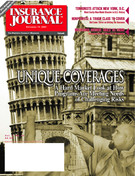The above phrase, first linked to cigarette ads, could be dismissed as politically incorrect, with its implication that females are inherently childlike. But applied to the experiences of women in insurance as well as any number of professions in the past few decades, the phrase is not entirely wrong. Women have “come a long way,” moving up through the ranks in insurance and other industries and breaking multiple professional barriers along the way. Whether or not women are “there” yet is a moot point, since “there” is essentially a moving target and one that is highly personal as well.
For each of the women interviewed in this issue of IJ Texas about their careers in insurance, the key word was “opportunity.” No matter what the working environment was like when any or all of these women started their careers, they all agreed that the industry is wide open for people, women or men, who are willing to work hard, learn about the industry and get involved.
Many came into the profession by chance. Rosemarie Marshall, TSLA president and vice president of HEATH Insurance Brokers, entered the insurance industry because she didn’t go to an interview with a construction company before she interviewed with an insurance agency. They were scheduled for the same day. “The funny thing is,” said Marshall, “if I’d gone to the construction company interview I might have been running a construction company by now.”
Western Integrity executive vice president, Neysa Gresham, took a summer job with an insurance company at the request of an ex-boyfriend’s mother. Gresham had expected to last for a summer, but it was two years before she moved on to her next job—in insurance.
Mary Russell, now a vice president with Higginbotham & Associates, got married, moved to Fort Worth and took a job at American General because she found out from her mother, who was employed by American General in Houston, there was an opening there.
But no matter how they came to the industry, they found rewards in hard work, in learning as much as they could, in asking questions, in finding mentors and in taking risks. And that is the message they would pass on to young people entering the field. Repeated again and again were phrases such as: “Be the best that you can be.” “Do the very best that you can—the rewards are phenomenal.” “Study. Learn what you can.” “Ask questions.” “Get involved.” “Find someone to learn from and follow them around.” All sound words of advice for people young or old entering any new profession or aiming for a higher level an established one.
Another common theme was the notion that working in insurance is about working with people. Not one of the women interviewed mentioned numbers, statistics, premiums or forms in connection with the joys of working in insurance. Those things, it seems, are only the tools of the trade. Being able to assist people with the coverage they need; developing relationships with co-workers, clients, agents and brokers that expand beyond the workplace; and the ability at the end of the day to say they’ve helped someone were the most valued aspects of their careers.
The women cited the difficulties of a narrowing market as the number one challenge in their current working environment. At the same time, they agreed the challenges keep life interesting. “We are inundated with new submissions and markets are limited now,” said Sherri Hendricks, vice president of transportation for Specialty Insurance Managers. “With e-mail, fax, phone calls—it’s hard keeping up the service, but the challenge is great.”
Rosemarie Marshall echoed the sentiment. “The market has changed dramatically in the past 6 to 12 months,” said Marshall. “You have to sell an account more than we did a year ago. There’s no such thing as a routine account. But that makes it kind of fun.” Marshall added that it’s a good day “when you finally get the tough one put together—you get a quote together and you get the order.”
Higginbotham’s Russell agreed that the marketplace and industry as a whole in Texas are her biggest challenges. “We have hailstorms, tornadoes, hurricanes—and a lot of carriers don’t want to cover certain things. We spent 10 years fighting foundation problems and now we have mold issues,” said Russell, adding, “…we just want to sell insurance, we want to put it on the books.”
And for those in the insurance business, that may be the one thing that never changes.
Was this article valuable?
Here are more articles you may enjoy.


 A 10-Year Wait for Autonomous Vehicles to Impact Insurers, Says Fitch
A 10-Year Wait for Autonomous Vehicles to Impact Insurers, Says Fitch  Insurify Starts App With ChatGPT to Allow Consumers to Shop for Insurance
Insurify Starts App With ChatGPT to Allow Consumers to Shop for Insurance  Trump Demands $1 Billion From Harvard as Prolonged Standoff Appears to Deepen
Trump Demands $1 Billion From Harvard as Prolonged Standoff Appears to Deepen  Insurance Issue Leaves Some Players Off World Baseball Classic Rosters
Insurance Issue Leaves Some Players Off World Baseball Classic Rosters 


